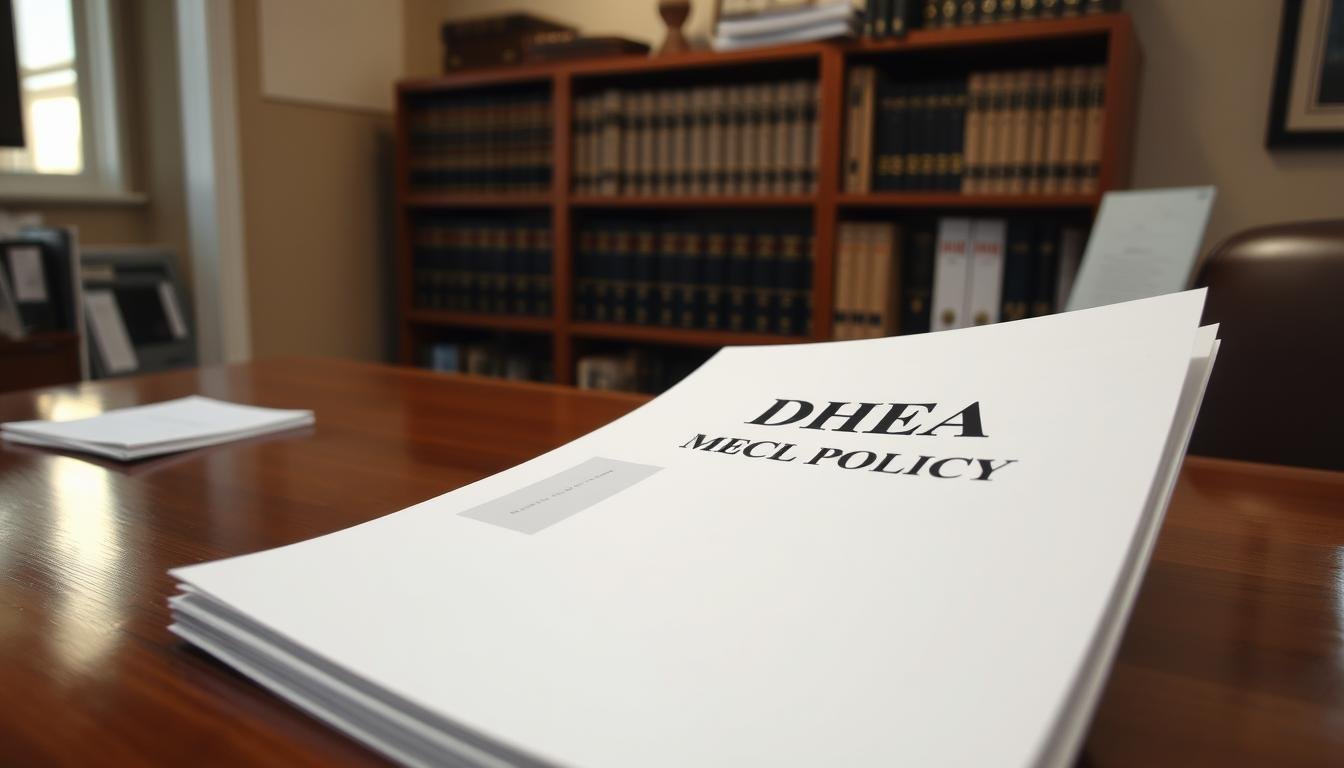If you’re in the military, you know about strict rules on supplements. DHEA, a hormone, is a big topic. Knowing the military policy on DHEA is key to following the rules.
DHEA’s use is debated because of its effects on performance and health. If you’re thinking about taking DHEA or already do, knowing the military’s stance is crucial. Learning about these policies helps you make smart choices for your health and career.
Contents
- 1 What is DHEA and Why Do People Use It?
- 2 Understanding Military Supplement Regulations
- 3 Is DHEA Banned in the Military?
- 4 Consequences and Considerations for Military Personnel
- 5 Understanding DHEA Regulations in the Military
- 6 FAQ
- 6.1 What is DHEA and is it a banned substance in the US military?
- 6.2 Why is DHEA considered a high-risk supplement by the military?
- 6.3 Are there any specific military regulations or policies regarding DHEA?
- 6.4 Can military personnel use DHEA if they have a prescription from a doctor?
- 6.5 What are the consequences for military personnel who test positive for DHEA?
- 6.6 How can military personnel ensure they are complying with regulations regarding DHEA?
- 6.7 Are there any safe alternatives to DHEA for military personnel?
What is DHEA and Why Do People Use It?
DHEA, or dehydroepiandrosterone, is a natural steroid hormone. It’s popular for its potential benefits. The adrenal glands produce DHEA, which helps make testosterone and estrogen.
So, why do athletes and military folks use DHEA? They believe it boosts physical performance and energy. It’s thought to help them recover faster from hard workouts.
But, there’s a catch. The supplement world isn’t well-regulated. This means DHEA quality can vary a lot. Also, how DHEA affects people can be different, and there might be side effects.
For those in the military, DHEA use is especially important. Knowing DHEA supplement regulations is key to avoid trouble with military rules. We’ll dive deeper into how DHEA and military rules intersect.
In short, DHEA is sought after for its benefits on health and performance. Yet, its use, especially in the military, needs careful thought about rules and risks.
Understanding Military Supplement Regulations
It’s key for military folks to know the rules about dietary supplements. The military has strict guidelines to keep everyone healthy and safe.
Several groups, like the Department of Defense (DoD) and the U.S. Anti-Doping Agency (USADA), watch over supplement use. They work together to make sure supplements are safe for military people.
| Regulatory Body | Role | Impact on Supplement Use |
|---|---|---|
| Department of Defense (DoD) | Oversees the overall health and safety of military personnel | Sets guidelines for permissible supplements |
| U.S. Anti-Doping Agency (USADA) | Monitors compliance with anti-doping regulations | Tests for banned substances in supplements |
| Supplement Manufacturers | Produces dietary supplements for military personnel | Must comply with DoD and USADA regulations |
The rules affect what supplements are okay or not. Military folks need to know these rules to avoid getting in trouble.
To follow the rules, military people should check official sources and talk to health experts. This helps them stay up-to-date and make smart choices about their health and supplements.
In short, knowing the rules about supplements is crucial for military members. It helps them stay healthy and avoid trouble. By understanding the rules and the roles of different groups, military folks can safely use dietary supplements.
Is DHEA Banned in the Military?
To understand if DHEA is banned in the military, we need to look at each branch’s rules. The military’s view on DHEA is complex, with different rules in each branch.

The Army, Navy, Marine Corps, and Air Force each have their own rules about supplements, including DHEA. To find out if DHEA is banned, we must look at each branch’s specific rules.
Army Regulations
The Army has strict rules about dietary supplements. Army Regulation 40-501 says service members can’t use supplements banned by the Department of Defense (DoD). DHEA is banned if it’s used to boost performance.
The Navy and Marine Corps also follow DoD rules on supplements. For them, DHEA is watched closely. Using DHEA without permission or for non-medical reasons can break military rules. It’s important for service members to talk to their commanders or doctors before using DHEA.
Air Force Guidelines
The Air Force has similar rules to the other branches. They make sure supplements, like DHEA, don’t harm health or performance. Air Force Instruction 44-121 talks about using dietary supplements, including DHEA, and stresses the need for medical supervision.
In summary, while DHEA isn’t banned everywhere in the military, its use is closely watched. Service members need to know their branch’s rules about DHEA to stay safe. The main point is that DHEA isn’t banned outright but is under strict rules that differ by branch.
Consequences and Considerations for Military Personnel
Military members need to think carefully about the risks and benefits of DHEA supplements. DHEA is a dietary supplement with health benefits. But, its use in the military is regulated.
Using DHEA without knowing the rules can cause problems. One big worry is failing a drug test because of hormone changes.
Failing a drug test can hurt your military career badly. Military rules on supplements are strict. Ignoring these rules won’t excuse you.
Potential Career Impact
DHEA and other supplements can affect your military career. A positive drug test or not following the rules can lead to:
- Disciplinary actions
- Loss of security clearance
- Impact on promotions and assignments
To avoid these risks, knowing and following DHEA supplement rules is key. Here’s a table with important points:
| Consideration | Description | Impact |
|---|---|---|
| Regulation Adherence | Understanding and complying with military supplement policies | Prevents disciplinary actions |
| Supplement Choice | Carefully selecting supplements to avoid banned substances | Reduces risk of positive drug test |
| Health Monitoring | Regularly monitoring health and supplement effects | Ensures overall health and readiness |
In summary, while DHEA might have benefits, military personnel must think about the risks. They should follow DHEA supplement rules to protect their careers.
Understanding DHEA Regulations in the Military
You now know a lot about DHEA and its rules in the military. The military policy clearly says DHEA is banned because it’s seen as an anabolic steroid. Military people must follow these rules to avoid serious problems, like getting in trouble or even being kicked out.
It’s important to know what happens if you use DHEA or other banned substances. Make sure you know what supplements you’re taking and if they’re okay under military rules. Knowing the DHEA military policy helps you make good choices and stay out of trouble.
Knowing the rules and the dangers of not following them helps protect your career and keeps your honor as a military person. Always check the newest rules on military supplements to know what’s okay and what’s not.
FAQ
What is DHEA and is it a banned substance in the US military?
DHEA, or dehydroepiandrosterone, is a hormone found naturally in the body. It’s used as a dietary supplement. The US military has rules about DHEA use. It’s banned under certain conditions.
Why is DHEA considered a high-risk supplement by the military?
The military sees DHEA as risky. It can turn into testosterone and estrogen in the body. This might lead to false positives for anabolic steroids.
Are there any specific military regulations or policies regarding DHEA?
Yes, the US military has rules for dietary supplements like DHEA. The Army, Navy, Marine Corps, and Air Force each have their own policies. Service members must follow these rules.
Can military personnel use DHEA if they have a prescription from a doctor?
Even with a doctor’s prescription, using DHEA can still break military rules. It must follow specific guidelines.
What are the consequences for military personnel who test positive for DHEA?
Testing positive for DHEA can lead to serious consequences. This includes court-martial, non-judicial punishment, or being kicked out of the military.
How can military personnel ensure they are complying with regulations regarding DHEA?
To follow the rules, military personnel should know their branch’s policies on supplements. They should talk to a healthcare provider. And they should check the ingredients of any supplements they’re thinking about.
Are there any safe alternatives to DHEA for military personnel?
If you’re looking for a DHEA alternative, talk to a healthcare provider. They can help find safe and allowed options for you.

Marcellus Stark is an investigative journalist from San Francisco, USA. He writes about global bans, rules, and unusual laws. He shares clear, interesting, and well-researched stories that help readers understand surprising facts worldwide.

